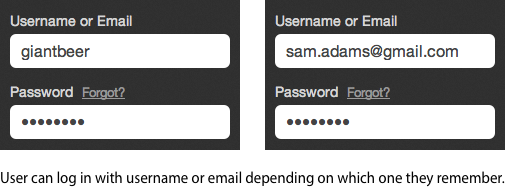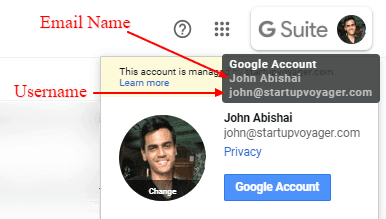An email username is the part of your email address before the “@” symbol. It is unique to you and helps identify your email account.
Choosing an email username is important. It often reflects your identity or purpose for the email. Whether for personal use or business, the right username ensures your emails are taken seriously. In this post, we will explore what makes a good email username.
We will also look at some tips on how to choose one. Understanding this can make a big difference in how your emails are perceived. Ready to dive in? Let’s get started!
Defining An Email Username
An email username is the part of your email address before the “@” symbol. It helps identify you uniquely in the email system.
### Defining an Email UsernameUnderstanding what an email username is can make your digital life a lot easier. You probably use it every day without giving it much thought. But do you know what it really means?In simple terms, your email username is the part of your email address that comes before the “@” symbol. It’s what identifies you uniquely within your email provider‘s system.####Basic Components
Your email username usually consists of your name, initials, or a unique identifier. For example, in “john.doe@gmail.com,” “john.doe” is the email username.It can include letters, numbers, and some special characters like periods or underscores. However, it cannot contain spaces or symbols like “&” or “#”.Creating a clear and memorable username is crucial. You want something easy for you to remember but hard for others to guess.####Difference From Email Address
Many people confuse their email username with their entire email address. But they’re not the same.Your email address includes both the username and the domain name (everything after the “@”). For example, “john.doe@gmail.com” is the full email address, while “john.doe” is just the username.Knowing the difference can help you manage your email settings and troubleshoot issues more effectively.Think of your email address as your complete mailing address, while your username is like your house number. Both are essential but serve different purposes.Have you ever wondered why some usernames are accepted while others are not? Understanding the basic components and differences can help you create a username that fits all the requirements.So, next time you set up a new email account, you’ll know exactly what to do. Choose wisely!
Credit: cullenwebservices.com
Creating An Email Username
Choosing the right email username is crucial for both personal and professional use. A good username sets the tone for your communication. It reflects your identity and helps others recognize you.
Best Practices
Keep it simple and professional. Use your first and last name. If your name is common, add numbers or symbols. Avoid complex characters or long strings of numbers. Ensure it’s easy to read and remember. Check availability before finalizing.
Common Mistakes To Avoid
Do not use slang or inappropriate words. Avoid using your birth year or any personal information. Refrain from using random strings of characters. Ensure it does not resemble a spam or fake account. Avoid using work-specific jargon if for personal use. Keep it consistent across different platforms.
Security Considerations
Email usernames are an essential part of your online identity. They often serve as your primary identifier for accessing various online services. Due to their importance, it’s crucial to consider security aspects related to your email username.
Protecting Your Username
Ensure your email username is unique and not easily guessable. Avoid using common names or predictable patterns. Use a combination of letters, numbers, and symbols if possible. This makes your username harder to guess.
Regularly update your email password. Strong passwords protect your account from unauthorized access. Use a mix of uppercase and lowercase letters, numbers, and special characters.
Avoiding Common Threats
Phishing attacks are a common threat. Be cautious of emails asking for your username and password. Verify the source before clicking any links or providing information.
Public Wi-Fi networks can be risky. Avoid accessing your email on unsecured networks. Use a VPN for added security when necessary.
Enable two-factor authentication. This adds an extra layer of security. It requires a second form of verification beyond your username and password.
Personal Vs. Professional Usernames
Creating an email username involves choosing between personal and professional styles. Personal usernames reflect individuality and interests. Professional usernames are often more formal, aligning with your work identity.
When creating an email username, it’s important to understand the difference between personal and professional usernames. Your choice can significantly impact how you are perceived by others. Whether you’re setting up an email for casual use or for business purposes, your email username says a lot about you.Choosing The Right Format
The format of your email username matters. For personal use, you can be creative. Think about adding elements of your personality or hobbies.For professional use, stick to a straightforward format. Typically, using your first and last name works best. If your name is already taken, try adding numbers or your middle initial.For example, if your name is John Smith, a professional email username could be john.smith or jsmith123. This keeps it simple and easy to remember.Impact On Branding
Your email username can affect your personal or business brand. A professional username builds credibility. It shows you take your career seriously.Imagine you receive an email from someone named “partygirl89”. Would you take that person seriously in a professional setting? Probably not.On the other hand, a professional username like “jane.doe” or “jdoe” conveys reliability and professionalism. This is crucial if you’re using the email for job applications, networking, or business communications.Your email username is often the first impression you make. Choose wisely to ensure it aligns with the image you want to project.Do you think your current email username reflects who you are or what you do? If not, it might be time for a change.Changing Your Email Username
Changing your email username can seem daunting, but it’s quite simple. Whether you want to update your username for personal or professional reasons, the process is straightforward. This guide will help you understand the steps and potential issues involved.
Steps To Change
First, log into your email account. Go to your account settings. Look for the option labeled “Username” or “Personal Information.” Click on it. Enter your new desired username. Save the changes. Your email provider might ask for your password again. This confirms your identity.
Potential Issues
Changing your email username can lead to some problems. You might not be able to use a name already taken. Some services might not recognize the change immediately. You could miss important emails if contacts use your old address. It’s best to inform your contacts about the change. Update your information on all linked accounts.
Credit: help.id.me
Email Username In Different Platforms
Understanding the concept of an email username can be crucial. Different platforms may have unique rules and variations for creating usernames. This section will explore these differences and guidelines to help you navigate various email services.
Variations Across Services
Email services like Gmail, Yahoo, and Outlook have different username rules. Gmail allows a mix of letters, numbers, and periods. Yahoo permits letters, numbers, underscores, and periods. Outlook accepts letters, numbers, periods, and underscores.
Each platform has its own set of characters and length requirements. For instance, Gmail usernames must be between 6 and 30 characters long. Yahoo usernames should be between 4 and 32 characters. Outlook requires usernames to be at least 3 characters long.
Platform-specific Guidelines
Gmail advises users to choose unique and memorable usernames. Avoid using personal information like birth dates. Yahoo suggests combining your name with numbers or other characters. This makes your username distinct.
Outlook allows more flexibility with special characters. You can use periods and underscores in your username. These minor differences can impact your choice of email service. Knowing these guidelines helps you select the best platform for your needs.
Troubleshooting Username Issues
Troubleshooting username issues can be frustrating. Email usernames are crucial for accessing your account. Users often face problems related to their usernames. This section will help you understand common problems and provide practical solutions.
Common Problems
Many users experience difficulty remembering their email usernames. This issue can lead to login failures. Another problem is incorrect username format. Users might forget to include special characters or numbers. Sometimes, usernames are already taken, forcing users to choose an alternate name. Finally, technical glitches can prevent proper username recognition.
Solutions And Tips
To avoid forgetting your username, store it safely. Use password managers to keep track of your login details. Ensure you follow the correct format when creating your username. Include necessary characters and numbers. If your preferred username is taken, try adding a combination of your initials and birth year. For technical issues, clear your browser cache or use a different browser. Resetting your password can also help resolve recognition issues.

Credit: uxmovement.com
Future Trends
Email usernames identify individual accounts within an email service. They often include names, initials, or unique identifiers. This makes usernames essential for online communication and personal branding.
Email usernames have come a long way since the early days of the internet. Today, they are crucial for personal branding and online identity. As technology evolves, so does the way we create and use email usernames. Let’s dive into the future trends shaping this essential part of our digital lives.Evolution Of Email Usernames
In the past, email usernames were simple and often just a combination of your first and last name. Over time, they have become more complex and unique. The need for distinct usernames has grown with the increasing number of email users.Now, people use a mix of letters, numbers, and sometimes symbols to create unique identifiers. This trend is likely to continue as more people join the digital world.You might notice that some companies encourage creativity in usernames. They know a unique email username can help you stand out.Impact Of New Technologies
New technologies are already affecting email usernames. Artificial intelligence (AI) and machine learning can suggest personalized usernames based on your preferences and online behavior. This makes the process easier and faster for you.Blockchain technology could also play a role. It might offer more secure and verifiable email usernames, reducing the chances of identity theft. Imagine having a username that is not only unique but also verified through blockchain.Virtual reality (VR) and augmented reality (AR) might change how we perceive email usernames. In a VR world, your email username could be part of your digital avatar, making it even more personal and integrated into your online identity.What do you think about these future trends? How do you see your email username evolving with new technologies? Share your thoughts and experiences in the comments below!Frequently Asked Questions
What Is An Example Of An Email Username?
An example of an email username is “john. doe@example. com”. This includes the user’s name and the email provider’s domain.
Is Your Username Your Email Address?
No, your username is not your email address. You create a unique username during registration.
What Is An Example Of A Username?
An example of a username is “john_doe123”. It often includes a combination of letters and numbers.
How Do I Find My Email Username?
Check your email account settings or profile page. Your email username is usually your email address before the “@” symbol.
Conclusion
Choosing the right email username matters. It reflects your identity online. Keep it simple and professional. Avoid using complex characters or numbers. A good username is easy to remember. It ensures you are recognized easily. Think carefully before deciding. Make sure it is suitable for all purposes.
Remember, your email username represents you. Make a wise choice and stay consistent. This small step can make a big difference.
